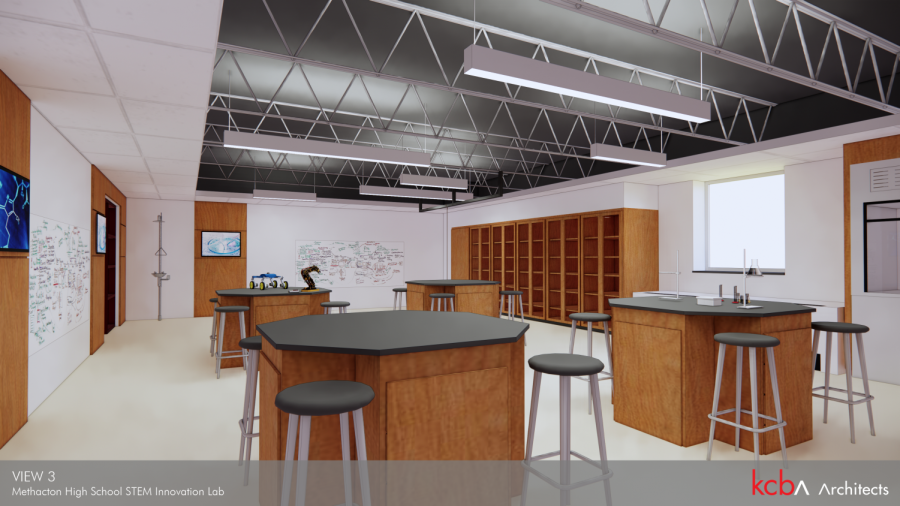Science department to add STEM Innovation Labs in 2022-2023 school year
KCB Architects
KCB Architects provided a blue print image of what the forensic, biochemistry and nutrition lab will look like when it comes to the MHS science program in 2022.
March 14, 2021
MHS will soon be the site of two brand new STEM Innovation Labs as part of an initiative to bring more STEM opportunities to current and future MHS students.
This will be largely due to the support of the Methacton Education Foundation that recently allocated more than $220,000 to the project.
One laboratory will be a hydroponic freight farm, headed by AP science teachers Mr. Savitz, Mr. Walton and special education teacher Mrs. Murray. It will involve a 320 square-foot insulated shipping container, housing a nursery and seeding station, among other things.
Its objective will be to teach students the process of hydroponics through hands-on experiences and will test their knowledge in interactive and engaging ways. Students also will learn about the specific components of hydroponics and growing sustainable plants. The teachers hope to use some of the grown food to donate to local food shelters and restaurants or to farmers markets. They also are entertaining the idea of having the school cafeteria incorporate the freight farm’s produce into its daily menu.
Mr. Savitz, an AP Environmental teacher at MHS for 21 years, said that an alternative farming methods video, “This Farm in a Box Generates $15,000 a Month,” he showed to his AP Environmental class was the inspiration behind the lab. Further discussions with Mr. Walton and Mrs. Murray eventually yielded a solid proposal.
The teachers’ main aim with this lab is to provide students with actual STEM opportunities, said Mr. Walton.
“STEM is, and should be, hands on. It is about discovery and problem solving. Most professions rely on science and math in some capacity. We want to prepare students for the future in a fun, active and healthy way. Growing food is healthy,” added Walton, who has taught AP Biology at MHS for 16 years.
The second STEM lab, which will be headed by Ms. Alveranga, Mrs. Palmer and Mrs. Griffith will explore forensics, biochemistry and nutrition. Forensics will include sample analysis, fingerprint analysis, gel electrophoresis and fractional distillation.
The biochemistry and nutrition courses will feature food analysis for macro and micronutrients, fad diet comparisons, food safety and foodborne illness prevention. Both of these courses will feature a state-of-the-art facility for students considering careers in science and, more specifically, scientific research.
The teachers hope that this lab “will be an opportunity for students to ‘try before they buy’, meaning they can have some actual experience in a lab setting to see if it something that they enjoy.”
Mrs. Griffith, who has taught numerous science courses for more than 26 years, said the Methacton Education Foundation, interested in moving the district to be on the cutting edge of STEM education, helped make the laboratory a reality. She further explained why STEM is so critical for young people.
“STEM opportunities make up nearly 10 percent of the current job market. Allowing students to experience a lab setting to see if it is or even isn’t for them is a really exciting prospect.”
Both teacher groups are aiming to offer these labs to juniors and seniors starting in the 2022-2023 school year. They hope as time progresses that these experiences will be available to all MHS students.
Mr. Walton emphasized why a laboratory setting is so vital to students’ education.
“The one thing I love about teaching science is that we can do and witness the topics we learn about in class. This lab gives us a new and unique opportunity to have students actively and physically participate in their education. They can experiment, discover, trouble shoot, problem solve and learn by doing instead of just reading and listening.”



